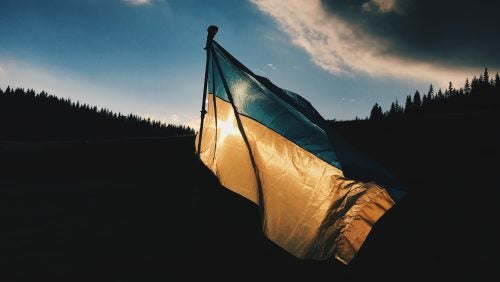Ukrainian Hostages of Russian Aggression: How Ukrainian citizens are deprived of the guarantees of the right to life
November 2, 2022 by Digital Editor

Max Kukurudziak - Unsplash
By Sergiy Panasyuk
By invading sovereign Ukrainian territory in February 2022 and starting a large-scale war, Russia continued its violation of international rules, principles, and order. These violations first began in 2014 when it annexed Crimea and occupied the Donetsk and Luhansk territories.
Among the international law violations by Russia in Ukraine, the most pressing is a violation of a fundamental human right – the right to life. Ukrainians who have been forcibly deported from Ukraine or have been taken hostage in the occupied and/or annexed territories have been deprived of this basic right.
Article 3 of the Universal Declaration of Human Rights states that everyone has the right to life. Article 6 of the International Covenant on Civil and Political Rights states this right is inherent to every human being, cannot be arbitrarily deprived, and shall be protected by law.
States are obliged to protect the right to life as a non-derogable and absolute right. The obligation applies not only to the Council of Europe member states, but also to other countries, which have signed agreements such as the International Covenant on Civil and Political Rights, the European Convention on Human Rights, and the American Convention on Human Rights.
Commenting on Article 6 of the International Covenant on Civil and Political Rights, the UN Human Rights Committee specified that any act of aggression as defined in international law, resulting in deprivation of life, is an ipso facto Article 6 violation. All states, as members of the international community, are obliged to protect lives and the right to life against acts of aggression. If states do not take all reasonable measures to settle their international disputes through peaceful means, they will not be in compliance with their positive international obligation to ensure the right to life.
Protocol No. 6 to the Convention for the Protection of Human Rights and Fundamental Freedoms, recognizes the right to life as an absolute right and abolishes the death penalty. However, Article 2 of the Protocol allows states to make a provision in its laws for the application of the death penalty in times of war, with respect to acts committed during war or imminent threat of war. The State shall communicate such a provision to the Secretary General of the Council of Europe.
Ukraine does not prescribe the death penalty in its legislation, so the right to life on its territory is absolutely protected (allowing no death penalty at all in any case, even in the case of war or martial law). However, occupied territories are not covered by this protection. Moreover, in the self-proclaimed republics, before their illegal accession to Russia, the death penalty existed and has been applied. Thus, the right to life for Ukrainian citizens, who were held hostage in non-recognized “republics,” or were forcibly displaced there, was violated..
Ukrainians who were forcibly relocated to Russia (or to newly annexed territories) also face this same danger because Russia is excluded from the Council of Europe. Russia is also likely to reinstitutethe the death penalty, which would allow for the execution of Ukrainians at the Kremlin’s will.
The risk of politically motivated reprisals against Ukrainians is very high. The first “contenders” for such illegal executions may be the Ukrainian soldiers from the “Azov” battalion/regiment, which was designated as a terrorist organization. Such a case can be the start of many more cases alleging criminal charges punishable by death against Ukrainian soldiers.
The Kremlin can also indirectly violate the right to life of Ukrainians, namely by ignoring the Geneva Convention Relative to the Treatment of Prisoners of War. Though Russian Parliament’s effort to ban the exchange of the Ukrainian soldiers evacuated from Mariupol’s Azovstal steel plant ultimately failed and some soldiers were released, the State of Duma Speaker Vyacheslav Volodin’s statement that the Ukrainian soldiers are Nazi criminals who should not be exchanged, is a concerning sign for what may face other prisoners of war. By preventing exchanges, Russia violates Article 109, paragraph 1 of the Geneva Convention, which requires that the seriously wounded and seriously sick prisoners of war be sent back to their own country. These violations can lead to the death of the remaining wounded prisoned Ukrainian soldiers, either because of critical health problems or because of a court-imposed death sentence.
Importantly, prisoners of war cannot be punished simply for being participants in armed conflict. They can only be charged for war crimes and have the right to a fair trial in a court of law. Still, it is unlikely Ukrainian soldiers will be afforded this protection considering Volodin’s statements, and particularly in light of Russian actions in Bucha, Irpin, Izum, Mariupol, and other places.
Russia clearly will not play by the rules and will not fulfill international obligations because it understands only the “law of force.” Russia has ignored calls from the UN General Assembly to “immediately, completely and unconditionally withdraw all of its military forces from the territory of Ukraine” and an order from the International Court to “immediately suspend the military operations in Ukraine.”
There are only two solutions to Russian aggression: review international organizations’ procedures and participation rules or respond through proportionate force.
One thing is for sure: if the world does not find a way to stop Russia’s actions, Russia will destroy modern democratic principles, rules and order, and will continue its human rights violations. And Ukraine will certainly not be its last stop.
Sergiy Panasyuk, Ph.D in Constitutional Law; Professor in the Department of General Studies at the Ukrainian-American Concordia University (Kyiv, Ukraine); Professor in the Department of Law at the European University (Kyiv, Ukraine); Academic Consultant for the Judge of the Constitutional Court of Ukraine.

